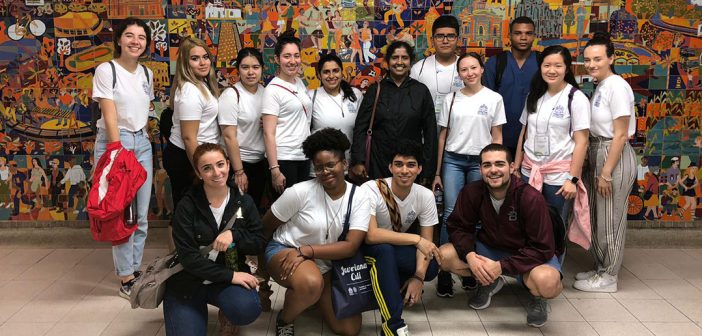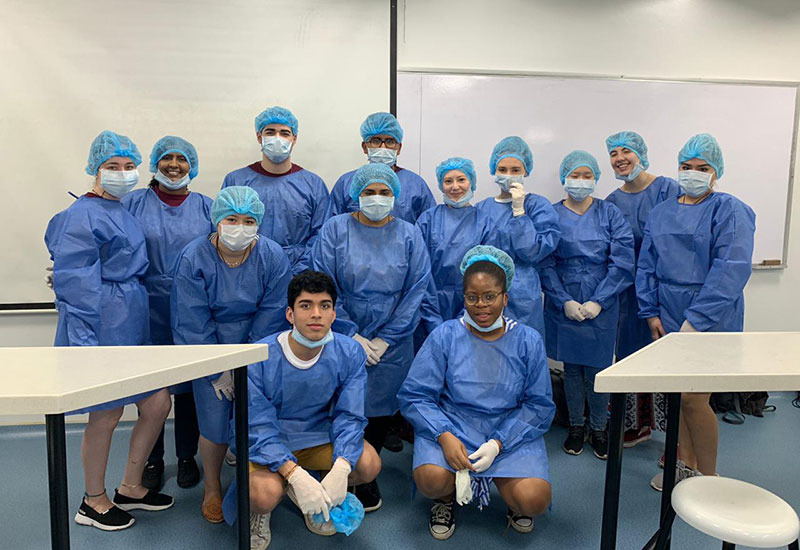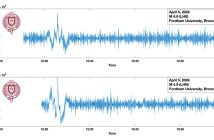This article was written by Usha Sankar, Ph.D., a lecturer in the biology department and an adviser to senior students.
The words study abroad bring to mind traveling to new places, meeting different people, eating all kinds of delicious foods, and having new experiences. I had the pleasure of leading a dozen Fordham pre-health students to Cali, Colombia, on a weeklong study abroad course. Since this is the third time I am leading this course, I can say that study abroad not only opens students’ eyes to new cultures and new possibilities but also gives them the opportunity to learn about themselves.
Almost half of all Fordham undergraduates study abroad, but it is not very common for students in the pre-health professions track. A one-credit service course, called Community Health in Cali, Colombia, held each year during spring break, is probably the only study abroad program available for pre-health students. As the faculty leader, I have always enjoyed the trip as it feels like an extension of my Human Physiology course here on campus. Not only do we talk about human health and disease, but I can also extend the discussions on health care systems in the U.S. and abroad.
As part of the service course, these students get to visit the city of Cali and learn about the health care system there. Colombia has the fourth largest economy in Latin America and Cali is the third largest city in Colombia, located southwest of Bogotá and situated in the Valle de Cauca. It is a thriving metropolis of about 2.4 million people. Cali has many private and public universities and Fordham has a special relationship with Javeriana University, a private Jesuit university that hosts us while we’re there. Javeriana is a nonresidential university with undergraduate and graduate programs; it also has a medical school. Colombian students start medical school directly from high school and graduate in five years, followed by a one-year internship and residency.
Fordham students are inquisitive and eager to learn about other cultures and different health care systems. The study abroad course is ideally suited for pre-health students interested in pursuing medicine as well as public health. What we discover is that Colombia’s healthcare system is based on the income level of the people and organizes the population into six strata, or levels. The bottom-most layer is made up of people that have very low or no income; their basic medical care is covered by the government. At higher income levels, people receive better medical coverage from their employers. People at the highest strata are often able to pay out of pocket and access the best medical care available.
As the week progressed, we interacted with many Javeriana medical students, who are very open and friendly, and attended lectures and labs with Javeriana medical school faculty. The students dissected pig hearts, studied the electrophysiology of the cardiovascular system, and learned how to get a medical history of patients in Spanish. They also listened to a lecture on the various facets of being a physician—the hard work, the physical and emotional toll, as well as the financial remuneration. One of the medical school professors also highlighted the most important reason to choose medicine as a profession: the capacity to serve others and derive happiness from it.
We visited several hospitals and clinics to get a better idea of the healthcare system in Colombia. One of the best and most touching experiences for students was visiting the Institute for Deaf and Blind children, where the disabled children get necessary surgeries and treatments for their conditions. The institute also has a school that teaches them skills to make them independent and help them transition to high school and college so that they can become productive members of society.
We also got to be a part of an outreach program run by Javeriana public health faculty and Javeriana medical students. The students visit areas in and around Cali, especially on the hillsides, where it might be harder for people to access the medical centers. They talk to people about good nutrition, maternal and children’s health, vaccinations, how to maintain healthy lifestyles, and exercise, among other things. This is a great opportunity for Fordham students to actually meet the local people and interact with them.
One of the most important aspects of education, and certainly Jesuit education, is to reflect on the learning and incorporate the learning into practice. As part of the program, I asked the students to submit a daily reflection. At the end of the trip, I asked them to write a reflective paper examining how the program influenced their thinking in terms of their commitment to health professions, and how they might incorporate the lessons they learned in Cali moving forward. All the students felt that the program helped them to visualize themselves in medical school and a hospital setting and to be able to communicate with people from different backgrounds. They felt a new sense of confidence.
In all, it was a fun and educational experience and that leaves the students reenergized and refocused on their future plans to be part of a profession that improves lives. The most important thing we learned about was our ability to connect at a very human level—and that it’s our connections that define us, not our differences. That, I hope, is the lasting message that resonates with all my students, regardless of the professions they enter.
Photos courtesy of Usha Sankar.
Top photo, standing, left to right: Sydney Souness, Antonia Flores, Maribel Molina, Samantha Hamilton, Fatima Khan, Usha Sankar Ph.D., John Soriano, Brittany Zaita, LiYing Wei, Stephanie Pepdjonovic. Sitting, left to right: local guide Veronica Paris, Issy Asianah, Kevin Quiah, Daniel Garcia




